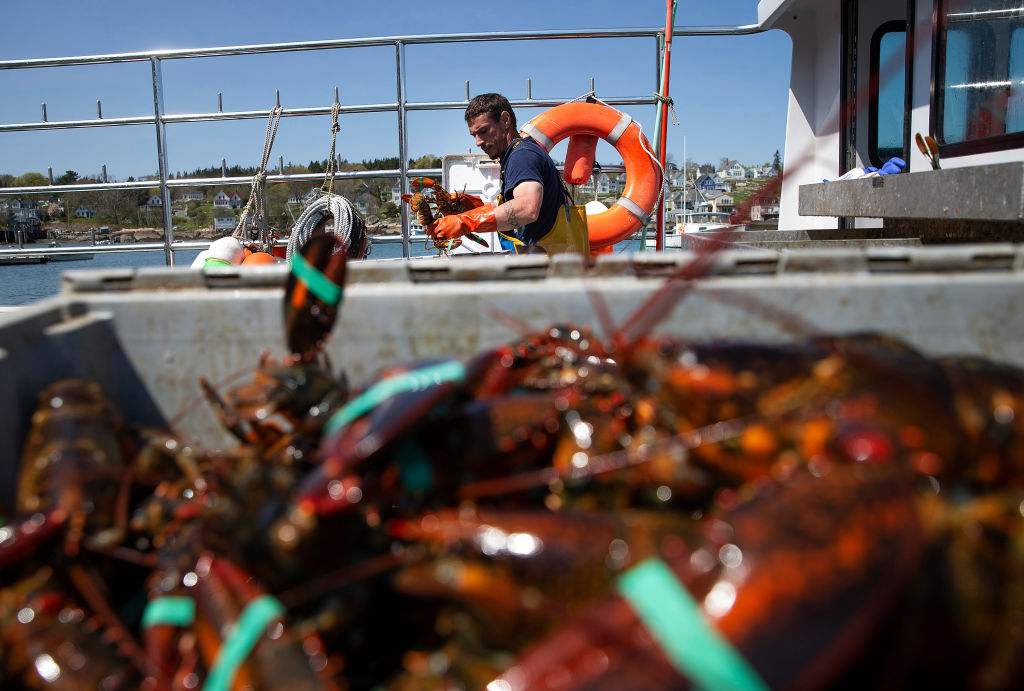
Maine.
When you hear the word, images immediately come to mind. Gorgeous coastlines, expansive mountains, untouched forests—all living up to the state’s motto of “the way life should be.”
But I’ll bet most of you also think: lobsters. And rightfully so.
Unfortunately, Maine’s lobster industry—and the thousands of people and small businesses who rely on it along our state’s coastline—find themselves in immediate peril. You may no longer be able to buy lobster at the grocery store or snag a tasty lobster roll at your favorite restaurant.
Why? Not climate change, business interests, or supply chains. The urgent threat to our lobsters is a California-based interest group that has appointed itself judge, jury, and executioner of this iconic catch—the most valuable in the country. And here’s the truly stunning thing—it was done without any real evidence.
More from TIME
Last week, the California-based Monterey Bay Aquarium’s Seafood Watch added Maine lobster to their “red list” of seafood to avoid due to environmental impacts. In attempting to make their case, they presented unsubstantiated threats that right whales are being entangled or harmed by the wires of lobsterpots. . In the days since, multiple national retailers have pulled the product from their shelves, with others weighing doing so.
Make no mistake, the declining population of North Atlantic right whales is a serious issue, and one that Mainers agree requires action. What it does not need is allegations and misinformation in the place of science-based solutions.
The late Senator Patrick Moynihan famously said “everyone is entitled to their own opinion, but not their own facts.” Here are some.
There has never been a right whale death attributed to the Maine lobster industry.
There hasn’t been a right whale entanglement attributed to Maine lobstering since 2004.
Since 2017, the majority of the right whale deaths reported have been attributed to ship strikes in Canadian waters.
In fact, recent years have seen a climate-driven migration of both lobster and right whales that has mostly separated the two populations. At this point, the overwhelming majority of lobster caught in Maine come from outside of critical right whale habitat, and represent less than three percent of the overall risk to the species.
That’s pretty clear and compelling context. You would think that a historically detail-oriented scientific organization would have included it in their report, or have substantial evidence that outweighs these realities.
But they don’t. Instead, Seafood Watch admits in its report that “due to a lack of information, it is often not possible to assign entanglements to a specific fishery,” and that Maine lobstermen may not be to blame for whale deaths. They decide to punish Mainers anyways, saying nobody should purchase lobster “until there is more specific information available.”
In other words, the Maine lobster industry is guilty until proven innocent. These assertions are suppositions wrapped in assumptions inside conjectures.
Let’s be clear: when I say the Maine “lobster industry,” I’m not talking about large corporate conglomerates reaping the delicious rewards of our waters with disregard to the environmental consequences. The “industry” is actually a loose collection of roughly five thousand sole proprietors who own their own boats, set their own traps, and sell their haul to make ends meet.
For decades, these lobstermen have committed themselves to the sustainability and long-term health of our waters—because they know that one day, just like those who came before them, it will be the turn of future generations to take to these tides.
That’s why lobstermen have collaborated with the National Oceanic and Atmospheric Administration to add safeguards to protect right whales over the years. They’ve instituted gear markings, so any right whale incident can be directly attributed to the source, and added weak links to their lines, so if a large mammal comes in contact, there is a strong likelihood the lines will break and cause minimal harm. In addition, they’ve removed an estimated 30,000 miles of line from the water to reduce hazards.
Not only does the Monterey Bay Aquarium ignore these efforts, they admit in their report that “effects on mitigation of whale entanglement have yet to be determined.” Somehow, in their backwards logic, we need conclusive, overwhelming evidence to prove Maine lobstermen innocent – but mere assertions to render them guilty.
Along with the Governor of Maine and the entire state Congressional delegation, I’m asking Seafood Watch to reverse this attack on the hardworking, conservation-minded lobster industry. Further, I’d ask them to come to the table and share any additional information they have so that we can all find a science-based balance solution that protects ocean ecosystems without hurting the livelihoods of thousands of people across Maine.
In the meantime, for the millions around the globe who enjoy Maine lobster, rest assured that you can continue to eat the delicious crustacean with your only guilt being that of all the butter (or mayo) you just consumed.
More Must-Reads from TIME
- L.A. Fires Show Reality of 1.5°C of Warming
- Behind the Scenes of The White Lotus Season Three
- How Trump 2.0 Is Already Sowing Confusion
- Elizabeth Warren’s Plan for How Musk Can Cut $2 Trillion
- Why, Exactly, Is Alcohol So Bad for You?
- How Emilia Pérez Became a Divisive Oscar Frontrunner
- The Motivational Trick That Makes You Exercise Harder
- Zelensky’s Former Spokesperson: Ukraine Needs a Cease-Fire Now
Contact us at letters@time.com